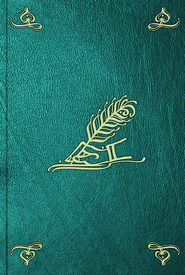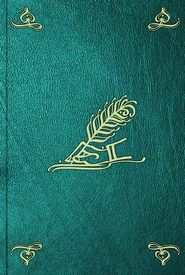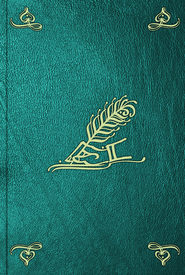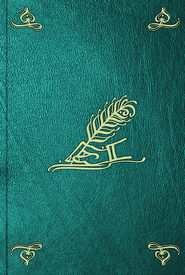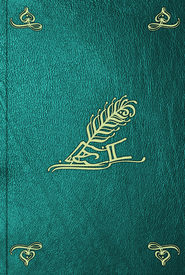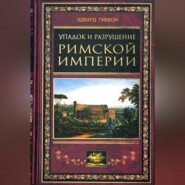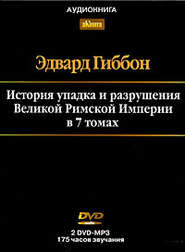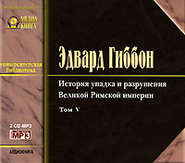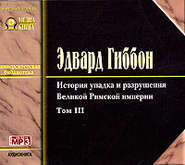По всем вопросам обращайтесь на: info@litportal.ru
(©) 2003-2025.
✖
Private Letters of Edward Gibbon (1753-1794) Volume 1 (of 2)
Настройки чтения
Размер шрифта
Высота строк
Поля
Parliament met January 19, 1775.
Footnote_279_279
Sir M. Featherstonhaugh married, in 1746, Sarah Lethieullier, who died in 1788. One of her brothers was Benjamin Lethieullier, M.P. for Andover. See note to Letter 230.
Footnote_280_280
Lord Beauchamp, at this time a widower, married, in May 22, 1776, as his second wife, Lady Isabella Shepheard, eldest daughter of the last Lord Irvine.
Footnote_281_281
Lady Mary Fitzpatrick, daughter of the first Earl of Upper Ossory, married, in 1766, Stephen Fox, second Lord Holland. She died October 6, 1778, without marrying a second time.
Footnote_282_282
Lord North proposed (February 10) a Bill restricting the trade of America with Great Britain, Ireland, and the West Indies, and excluding the colonists from the Newfoundland fisheries.
Footnote_283_283
The two members returned for Downton, Thomas Dummer and Thomas Duncombe, were declared not duly elected, and Sir Philip Hales and John Cooper declared duly elected.
Footnote_284_284
Sir Harbord Harbord, afterwards Lord Suffield, M.P. for Norwich.
Footnote_285_285
Efforts were made by Lord North to secure the loyalty of the province of New York, which at first repudiated the non-importation agreement of Congress, refused to print letters of the committee of correspondence appointed to carry out that policy, and declined to choose delegates to the second Congress which was to be held in May, 1775. Patriotic feeling, however, prevailed, and New York decided in April, 1775, to fall into line with the other colonies.
Footnote_286_286
On February 1, 1775, Lord Chatham, in the House of Lords, brought in a Bill for settling the troubles in America, by which it was enacted, inter alia, that no tax should be imposed on the colonists by the British Parliament without the consent of their own representative assembly. The Bill was rejected; but it probably influenced Lord North, who, on February 20, brought forward, in the Lower House, his conciliatory scheme. This was a resolution proposing that, if the colonists should make a satisfactory provision for the defence and government of the province, the right of taxing them should be suspended. Sir G. Elliot represented the Bedford party in the House of Commons.
Footnote_287_287
On February 22 Wilkes proposed a motion rescinding every step which the late Parliament had taken with reference to the Middlesex election. Gibbon voted for the motion against the Government. The motion was lost by 239 to 171.
Footnote_288_288
Wilkes.
Footnote_289_289
Robert Jephson's successful tragedy Braganza was played at Drury Lane in February, 1775, Mrs. Yates taking the part of Louisa, Duchess of Braganza. Gibbon is probably referring to this play in comparing Mrs. Holroyd to the spirited Duchess. The answer of "My Lady" is in keeping with the character of the Duchess as depicted in the play —
"I have a woman's form, a woman's fears,
I shrink from pain and start at dissolution.
…
Yet summoned as we are, your honour pledged,
Your own just rights engaged, your country's fate,
… Still would I on,
Still urge, exhort, confirm thy constancy,
And, though we perished in the bold attempt,
With my last breath I'd bless the glorious cause,
And think it happiness to die so nobly."
Footnote_290_290
Mrs. Gibbon's residence at Bath.
Footnote_291_291
See note to Letter 184.
Footnote_292_292
May 15, 1775.
Footnote_293_293
May 18, 1775. This Act, passed in the spring of 1774, sanctioned the free exercise of the Roman Catholic religion in Canada.
Footnote_294_294
On April 18, 1775, General Gage despatched several hundred British troops from Boston to destroy some military stores collected at Concord. On the 19th they reached Concord; but, on the return, they were attacked by the Colonial Minute-men, and were only saved from annihilation by the detachment which Gage had sent to their support at Lexington. The battle was immediately followed by the investment of Boston by the American militia.
Footnote_295_295
I.e. Hutchinson.
Footnote_296_296
The sloop sent by General Gage from Boston.
Footnote_297_297
A new edition of Madame de Sévigné's letters appeared at Paris in 1775 —Recueil des lettres de Madame la Marquise de Sévigné à Madame la Marquise de Grignan sa fille.
Footnote_298_298
Sir R. Worsley married, September 20, 1775, Miss Seymour Dorothy Fleming, daughter and coheiress of Sir John Fleming, Bart., of Rydal, Westmoreland, and Brompton Park, Middlesex.
Footnote_299_299
William Strahan (1715-1785), Printer to His Majesty, was at this time M.P. for Malmesbury. At the election of 1780 he was returned for Wootton Bassett; but did not seek re-election after the dissolution in 1784. He purchased in 1770 from Mr. Eyre a share in the King's Patent as a printer. His character is sketched in Nichols' Literary Anecdotes of the Eighteenth Century, vol. iii. pp. 390-397.
Footnote_300_300
Footnote_279_279
Sir M. Featherstonhaugh married, in 1746, Sarah Lethieullier, who died in 1788. One of her brothers was Benjamin Lethieullier, M.P. for Andover. See note to Letter 230.
Footnote_280_280
Lord Beauchamp, at this time a widower, married, in May 22, 1776, as his second wife, Lady Isabella Shepheard, eldest daughter of the last Lord Irvine.
Footnote_281_281
Lady Mary Fitzpatrick, daughter of the first Earl of Upper Ossory, married, in 1766, Stephen Fox, second Lord Holland. She died October 6, 1778, without marrying a second time.
Footnote_282_282
Lord North proposed (February 10) a Bill restricting the trade of America with Great Britain, Ireland, and the West Indies, and excluding the colonists from the Newfoundland fisheries.
Footnote_283_283
The two members returned for Downton, Thomas Dummer and Thomas Duncombe, were declared not duly elected, and Sir Philip Hales and John Cooper declared duly elected.
Footnote_284_284
Sir Harbord Harbord, afterwards Lord Suffield, M.P. for Norwich.
Footnote_285_285
Efforts were made by Lord North to secure the loyalty of the province of New York, which at first repudiated the non-importation agreement of Congress, refused to print letters of the committee of correspondence appointed to carry out that policy, and declined to choose delegates to the second Congress which was to be held in May, 1775. Patriotic feeling, however, prevailed, and New York decided in April, 1775, to fall into line with the other colonies.
Footnote_286_286
On February 1, 1775, Lord Chatham, in the House of Lords, brought in a Bill for settling the troubles in America, by which it was enacted, inter alia, that no tax should be imposed on the colonists by the British Parliament without the consent of their own representative assembly. The Bill was rejected; but it probably influenced Lord North, who, on February 20, brought forward, in the Lower House, his conciliatory scheme. This was a resolution proposing that, if the colonists should make a satisfactory provision for the defence and government of the province, the right of taxing them should be suspended. Sir G. Elliot represented the Bedford party in the House of Commons.
Footnote_287_287
On February 22 Wilkes proposed a motion rescinding every step which the late Parliament had taken with reference to the Middlesex election. Gibbon voted for the motion against the Government. The motion was lost by 239 to 171.
Footnote_288_288
Wilkes.
Footnote_289_289
Robert Jephson's successful tragedy Braganza was played at Drury Lane in February, 1775, Mrs. Yates taking the part of Louisa, Duchess of Braganza. Gibbon is probably referring to this play in comparing Mrs. Holroyd to the spirited Duchess. The answer of "My Lady" is in keeping with the character of the Duchess as depicted in the play —
"I have a woman's form, a woman's fears,
I shrink from pain and start at dissolution.
…
Yet summoned as we are, your honour pledged,
Your own just rights engaged, your country's fate,
… Still would I on,
Still urge, exhort, confirm thy constancy,
And, though we perished in the bold attempt,
With my last breath I'd bless the glorious cause,
And think it happiness to die so nobly."
Footnote_290_290
Mrs. Gibbon's residence at Bath.
Footnote_291_291
See note to Letter 184.
Footnote_292_292
May 15, 1775.
Footnote_293_293
May 18, 1775. This Act, passed in the spring of 1774, sanctioned the free exercise of the Roman Catholic religion in Canada.
Footnote_294_294
On April 18, 1775, General Gage despatched several hundred British troops from Boston to destroy some military stores collected at Concord. On the 19th they reached Concord; but, on the return, they were attacked by the Colonial Minute-men, and were only saved from annihilation by the detachment which Gage had sent to their support at Lexington. The battle was immediately followed by the investment of Boston by the American militia.
Footnote_295_295
I.e. Hutchinson.
Footnote_296_296
The sloop sent by General Gage from Boston.
Footnote_297_297
A new edition of Madame de Sévigné's letters appeared at Paris in 1775 —Recueil des lettres de Madame la Marquise de Sévigné à Madame la Marquise de Grignan sa fille.
Footnote_298_298
Sir R. Worsley married, September 20, 1775, Miss Seymour Dorothy Fleming, daughter and coheiress of Sir John Fleming, Bart., of Rydal, Westmoreland, and Brompton Park, Middlesex.
Footnote_299_299
William Strahan (1715-1785), Printer to His Majesty, was at this time M.P. for Malmesbury. At the election of 1780 he was returned for Wootton Bassett; but did not seek re-election after the dissolution in 1784. He purchased in 1770 from Mr. Eyre a share in the King's Patent as a printer. His character is sketched in Nichols' Literary Anecdotes of the Eighteenth Century, vol. iii. pp. 390-397.
Footnote_300_300







